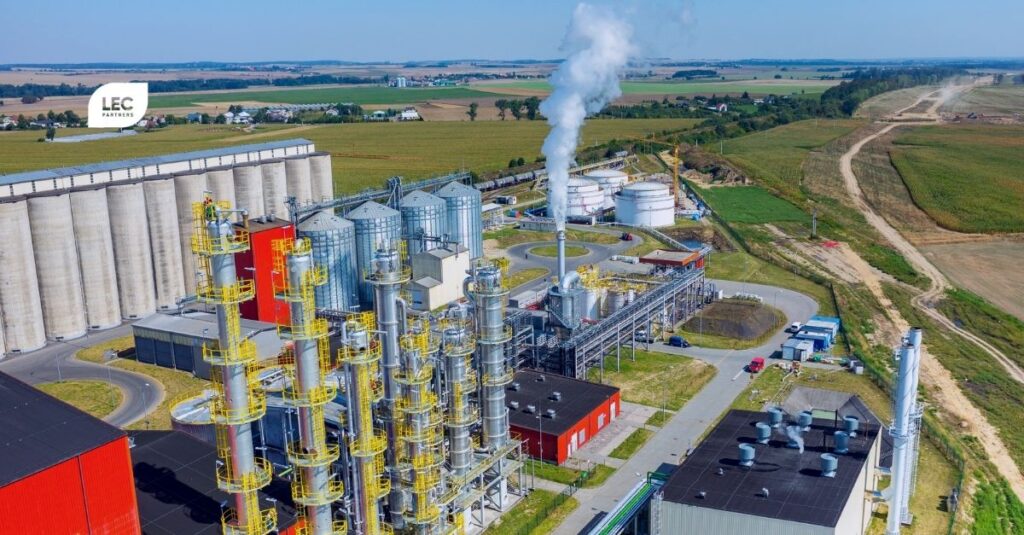Biofuels Experts & Consulting Services

Updated November 2025 to reflect current trends, technologies, and consulting insights in the global biofuels industry.
At LEC Partners, our biofuels experts help investors, developers, and operators evaluate, develop, and optimize renewable fuel projects. With deep technical, commercial, and regulatory experience across the bioeconomy, we guide clients from early feasibility through construction, operations, and performance improvement.
Whether you’re assessing a new ethanol or renewable diesel facility, upgrading an existing plant, or seeking guidance on carbon credits and compliance, our biofuels consulting team provides independent, data-driven insight to help you make confident investment decisions.
Our Expertise Across the Biofuels Value Chain
LEC Partners has one of the most experienced networks of biofuels consultants in the industry, with specialists in:
- Liquid Fuels: ethanol, biodiesel, renewable diesel, cellulosic ethanol, and sustainable aviation fuel (SAF)
- Gaseous Fuels: renewable natural gas (RNG), syngas, and biogas systems
- Emerging Technologies: algae-based fuels, Fischer-Tropsch diesel, pyrolysis oil, and other advanced pathways
- Feedstock & Carbon: lifecycle analysis, carbon intensity scoring, RINs, and carbon credit strategy
Our consultants combine decades of real-world plant experience with deep market intelligence—helping clients minimize risk, meet sustainability goals, and unlock greater value from every project.
Understanding Biofuels and Their Generations
Biofuels are renewable fuels made from biomass as replacements for petroleum-based products. They must meet lifecycle and greenhouse gas (GHG) reduction standards to qualify under most regulatory programs. Broadly, biofuels are categorized into four generations:
First-Generation Biofuels
Derived from edible biomass such as corn, sugarcane, soybeans, and other vegetable oils, these include ethanol and biodiesel. While well-established, they compete with food crops and are subject to land-use considerations.
Second-Generation Biofuels
Produced from non-food and waste feedstocks, these include cellulosic ethanol, forest residues, and industrial by-products. They offer improved sustainability and better GHG reduction potential.
Third-Generation Biofuels
Rely on engineered energy crops like algae, which yield biodiesel, gasoline, and ethanol at significantly higher output rates. Algae cultivation also captures atmospheric CO₂, improving the environmental footprint of fuel production.
Fourth-Generation Biofuels
Represent the cutting edge of metabolic engineering and carbon capture. These processes use bioengineered organisms and plants to sequester CO₂ and produce fuels with near-zero net emissions. As these technologies scale, they will play a vital role in decarbonizing transportation and industry.
Why Clients Choose LEC Partners
Our team doesn’t just analyze projects—we’ve helped build, operate, and improve them. Each engagement connects clients with proven specialists in engineering, technology development, and market strategy. We bring more than three decades of experience across hundreds of renewable fuel projects worldwide, covering:
- Technology & Feasibility Reviews: independent assessments for investors and lenders
- Project Development: feedstock evaluation, site selection, permitting, and design support
- Operational Optimization: plant audits, troubleshooting, and yield improvement
- Regulatory & Financial Advisory: RFS compliance, carbon markets, LCFS, and credit monetization
LEC Partners’ biofuels consulting practice is trusted for its integrity, technical rigor, and ability to translate complex technology into actionable business decisions.
Talk to a Biofuels Expert
Whether you’re exploring project feasibility, reviewing plant performance, or navigating regulatory compliance, our biofuels consultants can help you move forward with confidence.
Further Reading
Explore more insights and resources from LEC Partners and trusted organizations in the renewable fuels and bioeconomy sectors.
Insights from LEC Partners
Other Trusted Industry Resources
Have some questions?
Not sure where to start?
Let's start a conversation. We're here to help you navigate
the bioeconomy with confidence.
